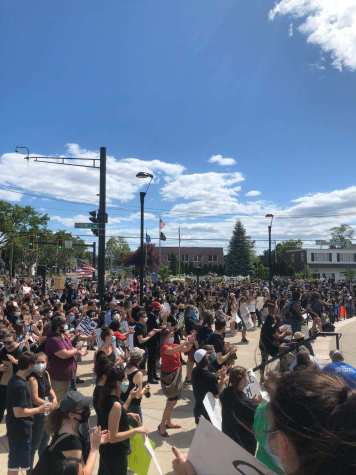The vice president for public relations of the SGA discusses Hamden protest
Jamien Jean-Baptiste questions and answers
June 12, 2020
Hundreds of peaceful protests against police injustices and racism toward black people have been taking place around the country and the world. On Sunday, June 7, Hamden Action Now organized a protest in Hamden — the town Quinnipiac University resides.
The protest was run by community activists ofHamden Action Now.They promoted the event by saying, “we stand in solidary with cities protesting the police murder of George Floyd. We also demand justice for Stephanie and Paul, Jarelle Gibbs, Chulo, and Murbarak Soulemane, to name only a few victims of state-sanctioned police violence and murder.”
Protestors met at 1 p.m. in front of the Hamden Police Department. One of the protesters was Jamien Jean-Baptiste, a rising senior and the vice president for public relations of the Student Government Association at Quinnipiac. Here are his responses after attending the Hamden peaceful protest.

(Some responses were condensed for clarity)
Q: What was your reason for going to the protest?
A: I definitely wanted to show support and I wanted to participate in some shape or form of protest. In my particular hometown, there hasn’t been many that have caught traction. So when I heard about the one going on in Hamden, I thought it was important because Quinnipiac University is located right in the smack of Hamden and I wanted to exactly see how they were addressing these issues and to know that when I were to return back to Quinnipiac in the fall, Hamden could actually be a home for me.
Q: As a black student, have the recent events given you new found inspiration or motivation to let your voice be heard?
A: Yes. I think this particular incident is causing a lot black folks in the community dissonance where we are caught between wanting to speak up and we are also caught in between wanting to educate other people. And that’s why we are seeing movements like the QU Enough is Enough, that’s happening because a student has found their voice and they want to take action. And it’s really been about using my platform and leadership roles. Just as a student at QU, to really elevate and educate others in terms of the movement, to make sure nothing is misconstrued. But I definitely found some inspiration during these events to kind of process everything and internalize it and move forward.
Q: At the Hamden Protest, were you surprised by the demographics of the people who turned out?
A: Yes, I definitely was. When we hold things like this at Quinnipiac, it doesn’t look the same as it did in the town of Hamden. I think I was expecting it to look a lot like what happened at Quinnipiac. But there were different people of different ages, races, and I think that was an invaluable lesson within itself that you know seeing different races kind of shed light on the fact that you don’t have to have a shared socio-economic or socio-cultural background in order to express solidarity for an event like this. And the different generations show that this is a timeless battle that’s been fought by people older than me and it is also going to be fought by people that are younger than me. So, I was genuinely impressed by the diversity in the actual crowd, the people that came to support.
Q: What were your lasting impressions when the protest was over?
A: It was really powerful. The first half was just the speakers and they were just different people from different facets and communities within Hamden, so you had the students from Hamden High School, you had some people from churches, you had some people from different commissions and councils. Right after that, we began marching down Dixwell Avenue and we ended up walking up to Route 115 where they shut down that section of the highway briefly while we were walking on. After all of it, it was definitely nice to see that much support, the amount that were invested from the start of the event to the end of it. To an extent, it gave me a little hope because as many hateful people there are in the world, I think it’s telling there are also a lot of supporters in our own community too.
Q: In the town, do you think people have changed for the better and things will improve?
A: There’s always been indications of this (police brutality) happening, but I think the particular killing of George Floyd was the tipping point where students and everybody and families were starting to really acknowledge that enough is enough and I think that inspired people to take action a little bit more. People always say they don’t want to make it about politics but that’s when people started realizing that this isn’t politics, this is just basic human rights. I think that’s when I started seeing more people take on the role of an activist and really speak out. I do have some hope for our community, I’ve seen a lot of it. A lot of people do it on social media and I would hope that continues in the fall and that continues throughout their lifetimes. Part of me does believe that there is hope.







